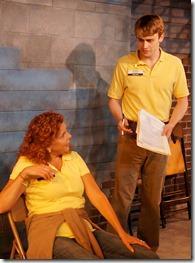
Good People
Written by David Lindsay-Abaire
Directed by Matt Hawkins
at Redtwist Theatre, 1044 W. Bryn Mawr (map)
thru Aug 2 | tickets: $30-$35 | more info
Check for half-price tickets
Read review
Masterful drama is richly layered, complexly compassionate
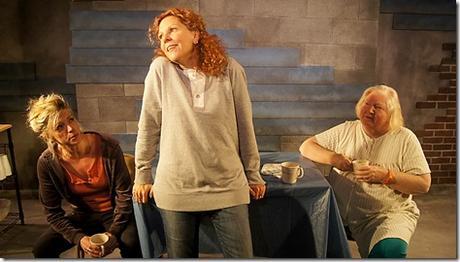
Redtwist Theatre presents
Good People
Review by Lawrence Bommer
It was a deserving hit at Steppenwolf Theatre three years ago. Well worth reviving, Redtwist Theatre’s more modest offering loses nothing in impact for what it sacrifices in scale. Their richly layered, devastatingly detailed and complexly compassionate Good People warmly delivers the goods–an engrossing look at the clash between luck and loyalty. For two roller-coasting hours, this all-absorbing play, grounded in grit, is waged between two painfully human persons, products of poverty living in diametrically different worlds – tony Chestnut Hill and decaying South Boston. The audience shifts sympathies here more often than the stock market on steroids.
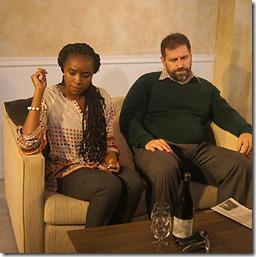
On one side is Margaret Walsh (Jacqueline Grandt, salt of the earth), her character mired in the tough times that lasted all her life and that make a mockery out of “Southie Pride.” She’s an unmarried mom who just lost a lousy $9.20/hour job at the Dollar Store because her disabled daughter keeps her chronically late. Unskilled for what little work is available, she’s late on the rent—and knows the church’s bingo tournaments won’t keep her solvent. Desperate for an end to a lifetime of bad luck, Margaret is intrigued to hear of the success of former boyfriend Dr. Mike Dillon (Mark Pracht, no-nonsense even when guilt-ridden), now a fertility physician with a thriving trade. She visits the man she gave up 30 years before, impressed by his plush office and snotty secretary. She gets herself invited to a party he’s throwing: Quickly and devastatingly, you see that the class divide between them is far greater than the memory of the affair they had before he went off to the University of Pennsylvania.
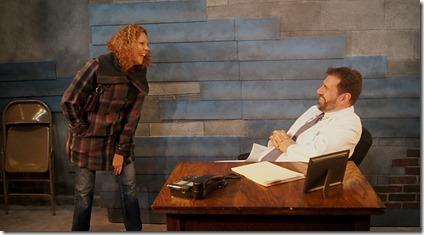
Passive aggression turned toxic, Margaret accuses him of deserting the neighborhood as a “lace curtain” Irishman. To Mike, defensive and suffering from “success guilt,” Margie remains a “shanty” girl, envious of the good choices he made. Or was it just good chances? Margaret is well aware that Mike’s fortune hung on several accidents: It could have been hers as well—or it could have gone south (as in Boston). Margaret doesn’t believe Mike when he cancels the party because of his daughter’s illness–and shows up anyway. There she meets Kate (Kiki Layne, dignified and at home with privilege), Mike’s equally prosperous African-American wife. Curious about her husband’s bleaker days in the old neighborhood, Kate finds out more than she wants to as, dissed and pissed, Margaret says more than she should.
Because the playwright exercises perfect control in depicting the free will of implacable antagonists, the clash between persistent poverty and nouveau wealth shifts from moment to moment. (Seldom has “awkwardness” been so potent as this play’s class clashes: When Mike asks Margie “How was the wine?,” her immediate, crudely honest response is “How the fuck should I know?”.) With the action lurching from one revelation to the next exposure, you simply can’t afford to take sides. Margaret’s urge to better herself and Mike’s conviction that he has every right to happiness are formidable forces
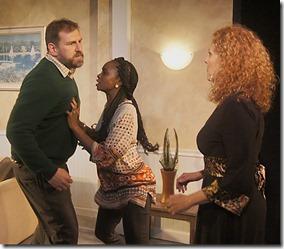
Lacking Steppenwolf’s detailed and class-conscious settings, Jeff-winning Matt Hawkins’ more suggestive staging nonetheless captures every twist with wrenching realism. This production practically festers with the kind of dialog you can never take back. As Margaret’s questionable supporters, Kathleen Ruhl and KC Karen Hill are engulfed in gossip and bad advice: Racist and ignorant, they’re exactly the crude creatures that Mike hoped to escape. Caught in the middle and trying to stay decent despite hard times and bad luck, acutely aware how deeply his firing Margaret will metastasize her rotten fortune, Aaron Kirby is Margaret’s former boss (who’s called gay because he likes bingo too much). He’s the only character here who suggests a middle way between the two deeply divided worlds of Margie and Mike. But is it enough?
If nobody but kindly Kate comes out looking good, it’s because the playwright gives us a brutally true play about America today. Our gulfs have never been greater. Why should theater be any different?
Rating: ★★★★
Good People continues through August 2nd at Redtwist Theatre, 1044 W. Bryn Mawr (map), with performances Thursday-Saturday t 7:30pm, Sunday 3pm (no show on July 4). Tickets are $30-$35, and are available online through their website (check for half-price tickets at Goldstar.com). More information at Redtwist.org. (Running time: 2 hours 10 minutes, includes an intermission)
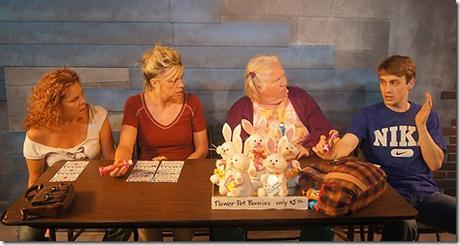
Photos by Jan Ellen Graves
artists
cast
Jacqueline Grandt (Margie), KC Karen Hill (Jean), Aaron Kirby (Stevie), Kiki Layne (Kate), Mark Pracht (Mike), Kathleen Ruhl (Dottie)
behind the scenes
Matt Hawkins (director), Scott Wolf (assistant director), Allison Queen (stage manager), Melissa Nelson (assistant stage manager), Eric Luchen (set designer), Kathryn A. Lesko (lighting designer), Karli Blalock (sound designer), Allison M. Smith (costume designer), Jan Ellen Graves (co-producer, photos, prop designer, graphic designer, marketing), Elise Kauzlaric (dialect coach), Catherine Miller (dramaturg, casting director), Charles Bonilla (box office manager), E. Malcolm Martinez (box office associate), Johnny Garcia (box office associate, associate producer), Michael Colucci (co-producer)
15-0626

